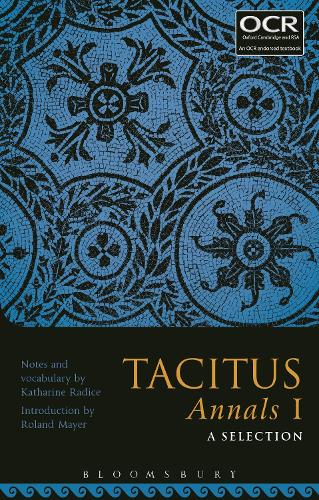
Tacitus Annals I: A Selection
Publishing Details
Tacitus Annals I: A Selection
By (Author) Katharine Radice
Edited by Professor Roland Mayer
Bloomsbury Publishing PLC
Bloomsbury Academic
7th April 2016
United Kingdom
Classifications
Tertiary Education
Non Fiction
Literary studies: ancient, classical and medieval
Ancient history
973.07
Physical Properties
184
Width 138mm, Height 214mm, Spine 10mm
240g
Description
This is the OCR-endorsed publication from Bloomsbury for the Latin AS and A-Level (Group 1) prescription of Annals Book I sections 1630 and the A-Level (Group 2) prescription of Annals Book I sections 37, 1114 and 4649, giving full Latin text, commentary and vocabulary, with a detailed introduction that also covers the prescribed text to be read in English for A Level.
Annals I starts with the death of Augustus and the beginning of Tiberius principate. Tacitus chronicles the uneasy and unprecedented transition from one to the other, in the context of a political elite shaken by years of civil war and unsure as to how best to protect their own interests and the stability Augustus had brought to Rome. With damning references to the servile nature of the new regime, Tacitus vividly paints scenes of confused senatorial debates, and Tiberius own uncertainty over his own position and the best decisions to make. Opportunistic rebellions in the army are described with dramatic brilliance.
Reviews
Because Tacitus has the reputation of being one of the most difficult Roman authors encountered by young students of Latin, texts like that of Radice and Mayer act as invaluable resources in the classroom. This well-organized handbook of 168 pages mitigates the intimidation of facing a challenging read like Annals I This book can be useful in any intermediate Latin reading course Overall, the authors have created a nice tool for introducing first-time readers of Tacitus to these important opening portions of the Annals, whether they are taking OCR exams or not. The book is thorough enough so as not to be overwhelming for a beginner, and sufficient to get a student through the text with a strong understanding, and possibly even an eagerness to read more Tacitus. * Bryn Mawr Classical Review *
A youngster reading Tacitus for the first time will find time working with this text profitably spent. * The Classical Journal *
Author Bio
Katharine Radice teaches Classics at the Stephen Perse Foundation, UK, and is an experienced examiner. She is co-author of Ovid: Amores III (Bloomsbury, 2011) and Cicero: De Imperio (Bloomsbury, 2013).
Roland Mayer is Professor of Classics at King's College London, UK.
